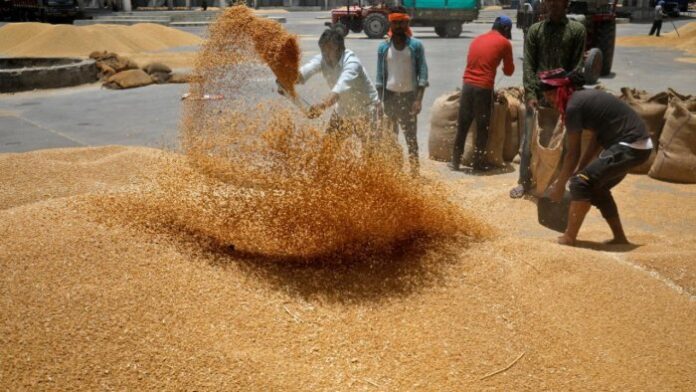India is in talks with Russia to import wheat at a discount to surging global prices in a rare move to boost supplies and curb food inflation ahead of state and national elections next year, according to four sources.
The imports would allow New Delhi to intervene more effectively in the market to drive down wheat prices that stoked inflation to a 15-month high in July.
“The government is exploring the possibility of imports through private trade and government-to-government deals. The decision will be made cautiously,” one of the sources told Reuters, when asked about wheat imports from Russia.
The government’s plan to import Russian wheat is one of the supply-side measures being considered to bring down prices of key commodities like fuel, cereals and pulse along with an extension of rural schemes to ease the impact of inflation on the poor, two of the sources with knowledge of the matter said.
Last month, Sanjeev Chopra, the most senior civil servant at the federal food ministry, said there was no proposal to import wheat from Russia.
LOW WHEAT STOCKS
Although India needs only 3 million to 4 million metric tons of wheat to plug the shortfall, New Delhi might consider importing 8 million to 9 million tons of wheat from Russia to have a far bigger impact on prices, another source said.
“Russia has indicated its willingness to offer a discount on prevailing market prices. There are no restrictions on the export of food commodities from Russia,” one official said.
India is also importing sunflower oil from Russia and settling payments in U.S. dollars and is planning to use the same approach, the official added.
“India can easily secure a discount of $25 to $40 per ton from Russia. This will ensure that the landed cost of wheat remains significantly below local prices,” said a dealer based in Mumbai with a global trade house.
Wholesale wheat prices in India surged around 10% over two months to a seven-month high in August on limited supplies.
Wheat stocks at government warehouses were at 28.3 million tons on Aug. 1, 20% below the 10-year average.

Last year, India banned wheat exports due to lower output, and this year’s crop is also expected to be at least 10% lower than the government’s estimate.





Exploring strategic solutions to stabilize wheat prices. 🌾🌎 This article delves into India’s consideration of wheat imports from Russia as a means to manage price fluctuations. A fascinating glimpse into the intricate balance of global trade and food security.
Wholesale wheat prices in India surged around